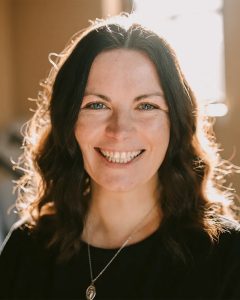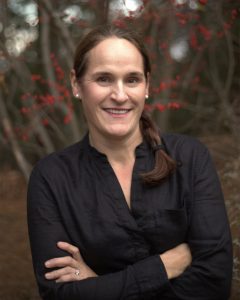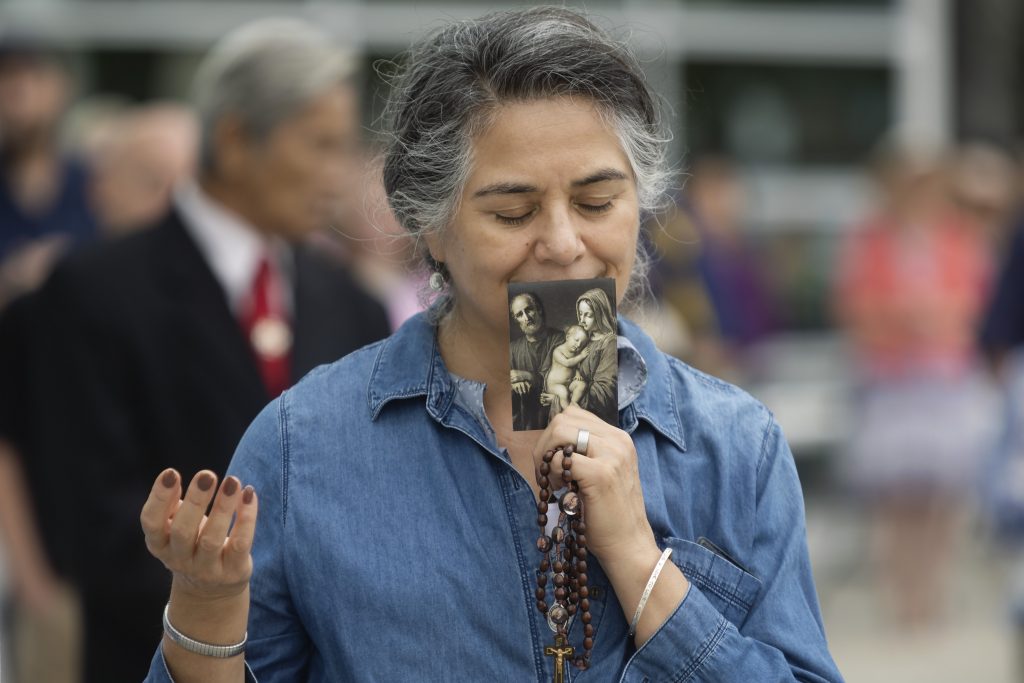For as long as it’s existed, feminism has been a thorny topic for Catholics to talk about. Debates within the movement about its goals — and how to achieve them — have exposed both areas of agreement and disagreement between Church teaching and feminism.
In his 1995 encyclical “Evangelium Vitae” (“The Gospel of Life”), St. Pope John Paul II weighed in, calling for a “new feminism,” which would “affirm the true genius of women” and transform “culture so that it supports life.” Where are we today?
Interestingly, the contours of those debates are changing in surprising ways. The recent Supreme Court Dobbs decision, new evidence of the grim consequences of the sexual revolution, and emerging questions about gender identity all suggest a turning point.
Three fresh voices — Erika Bachiochi, Abigail Favale, and Leah Libresco Sargeant — are among those arguing for a pro-life, sex-based feminism built on appreciation for and accommodation of sexual difference, the acceptance of the body rather than liberation from it, and community over autonomy. Angelus contributing editor Elise Italiano Ureneck recently spoke with them about their work. Their conversation has been edited for length and clarity.
Elise Italiano Ureneck: How do you define feminism? Should a Catholic be a feminist?
Abigail Favale: A good baseline definition has two parts: first is a belief in the equal dignity of men and women; second is a belief that there are significant social forces undermining that dignity. I draw on the work of Edith Stein, who said that a consequence of a fallen world is that the dynamic of harmony and communion between men and women has been disrupted into one of domination. Catholic feminism seeks to correct that dynamic of domination through the help of grace.
Leah Libresco Sargeant: The place where Catholic feminism might diverge from mainstream feminism is that we don’t believe women are interchangeable with men, which a sexist world asks of us. If we take male norms as the default, women have to compete in ways that cut across who we are — bodily, spiritually, and physically. Catholic feminists want a world for women to be in the world as women.
Erika Bachiochi: It’s helpful to think about our similarities and differences with men on three levels.
One is our shared human nature and dignity, which is oriented toward excellence. That involves the use of our reason, growth in virtue, and sanctity. The second is our sexual difference, which impacts every single cell in the body. In the Catholic vision, the Incarnation reveals how special, important, and unique the body is. The third is our individuality — who we are as a particular instantiation of a human woman. This is important for anti-discrimination law — the fact some women and men have gifts that are different from those which tend to correlate with their particular sex.
All three of these things need to be kept in tension and harmony when thinking about what feminism is.

Ureneck: All three of you have argued that many “givens” of feminism work against its goals: individualism, autonomy, casual sex, contraception, abortion — and in some circles, the inclusion of biological men who wish to be treated as women. Your vision for feminism is gaining traction with surprising audiences, like New York Times readers. What’s changing?
Sargeant: I see two key factors at play. One is the Dobbs decision. The Supreme Court didn’t make abortion legal, nor did it make it illegal. It made it a question that gets fought about on the state level. Now, pro-lifers can’t be marginalized; they have to be argued with. And it behooves people to spend a little time finding out what they think and why.
Second, people are confronting that the sexual revolution has been unsatisfying, and they’re wondering about the people who predicted its deficiencies for so long.
Bachiochi: The marketplace, educational institutions, and public settings have prioritized the autonomous individual so much that women who pursue educational or career goals have had to mold themselves as men.
Younger generations of women are wondering whether that race for material gain or prestige provides real meaning. Many women say that they want more children, but they’re wondering why they can’t be a mom and work at the same time.
Last, more and more young women can’t find mates to marry because of the pornography epidemic. And now they’re competing against men in their athletic events. All of this means they’re looking for answers that liberal feminism can’t give them because it’s articulated on the grounds of autonomy.
Favale: We’re witnessing the logical and sometimes absurd conclusions of ideas that have been in the feminist mix for decades, including suspicion toward femaleness and reluctance to settle on a shared understanding of woman.
“Woman” is used in a nominal way, as a cultural idea that someone can step in and out of, a political word that doesn’t signify anything real. Why does something like that need a movement to defend its dignity? Women who’ve grown up in a pornified culture want some ground to stand on to protect their dignity.
Sargeant: I love that question — ”What is the foundation you are standing on?” As more characteristics of womanhood are argued away, it seems like the only thing it means to be a woman is to be the victim of sexism. Without downplaying the seriousness of confronting sexism, that’s not a satisfying account. I wouldn’t cease to be a woman in a world where sexism was wholly resolved. That account lacks a positive articulation of what it means to be a woman.

Ureneck: What’s the best argument for a sex-based feminism, one that does not rely on abortion or contraception to achieve its ends?
Favale: When I talk about abortion and contraception, I make the pro-woman argument, which catches people by surprise. I point out that the freedom feminism has promised sets them at war with their own bodies. It says they need to function as much like a man as possible in society.
We should be changing society to accommodate the realities of childbirth, pregnancy, and lactation, not asking women to change their nature. Centering feminism on contraception and abortion reveals a fundamentally biased account toward the male way of being.
Sargeant: Pro-lifers share a goal with those who are pro-choice: reproductive justice. But our system is not just, and those who oppose us know it. One choice — abortion — is much more supported than the choice to have children.
You see that in companies that pay for travel for abortions or egg-freezing but don’t give substantial maternity benefits or leave. You see it in the push for long-acting reversible contraceptives like IUDs, which means not having children is the default. And they argue the best thing we can do for poor, nonwhite women is to foreclose the possibility of them having children instead of supporting them in having the children they want.
Bachiochi: It’s helpful to look at the unequal consequences when men and women engage in the same sexual act. It’s not only that women get pregnant and men don’t.
There’s a hormonal asymmetry, too: Testosterone makes men more likely to want casual sex, and estrogen and oxytocin facilitate the need for women to bond. But our society is biased toward the male experience. We say that because men can walk away from unexpected pregnancy, women should be able to. Men should be able to seek the corner office without being encumbered. So women should, too.
Women have long argued for a different response to these asymmetries — that men should be responsible, present collaborators in caring for the children they create, that they should be deeply encumbered just as the woman is. That would make for a virtuous cycle, where men and women take responsibility for their actions rather than escaping them. And that’s just better for everyone’s happiness as well. When you present an alternative argument, people respond.
Sargeant: Just to be clear, when we say we want to burden men, it’s not part of a war of women against men. It’s that men don’t know who they are without these burdens. Being light and unencumbered doesn’t leave us freer. It leaves us shapeless, directionless. That’s why we see so many men leaving the workforce, falling into drug use or succumbing to deaths of despair. To a real extent, men are asking, “Who needs me?” and feel like the answer is “No one.” They deserve a better answer.
Ureneck: You’re all well-versed in secular feminist scholarship and have praised its best contributions to the discourse on women’s dignity. What would you say to people who might blame feminism for the issues that men are facing?
Favale: When John Paul II first talks about the “new feminism,” he says that we need a feminism which does not simply replicate masculine modes of domination. One could argue that in some ways feminism has replicated those dynamics. But it would be a mistake to say that feminism invented them.
The feminist movement in all its waves has been responding to real societal problems. But sometimes the solutions they offered made those problems worse. I would point to the sexual revolution more specifically as a root cause, as well as industrialization, which took men out of the home to begin with. That created a split sphere of work and domesticity that is somewhat novel historically. Feminism plays into that separation.
Bachiochi: Right, men left the home to seek their own economic independence, yet they were dependent on capitalism. And women responded by seeking their own economic independence. I read something in a new book by Richard Reeves, “Of Boys and Men: Why the Modern Male Is Struggling, Why It Matters and What to Do about it” (Brookings Institution Press, $28.99), on this. He writes that we didn’t realize that once women sought economic independence from men — and so could choose not to be with them at all — how much men would suffer because of how emotionally dependent they were upon women. That’s where a new feminism sees if one rises the other can rise, and if one falls the other falls.
Sargeant: I’ll also put some blame on a particular error that’s very prevalent in America broadly, and thus in all American movements — that sense that we find ourselves through independence and should be suspicious of all constraints. It comes up in feminism, but it’s not a particular problem of feminism. It’s the fact that we think about freedom as freedom from people or things who have a claim on us, not freedom to act rightly, having a particular path cleared for us.

Ureneck: What can the Church do to make it easier to live out Catholic teachings on life, sex, and marriage?
Sargeant: The Church should set the standard for how to support parents in the workplace. I know the economics can be hard to work out, but that’s why the Church should set a model of how to make them work. It could be a guide star for businesses. Last, Catholics should hear about NFP well before they sign up for pre-Cana [marriage courses], and parishes should be natural places for people to share their needs.
Favale: The complementarity of men and women should be seen at higher levels of ecclesial administration, which doesn’t require ordaining women. Pope Francis has begun to do this, but there’s more we could do. There are ways of thinking with the Church’s tradition on increasing complementarity. Cardinals don’t have to be priests. Maybe we could have a female cardinal. Or we could look to the male and female communities that were part of medieval monasticism. They had a powerful synergy between them which we’ve sort of lost.
Bachiochi: One thing that would help would be making it very ordinary for men to talk to other men about fatherhood, even in the office.
Along those same lines we should see more babies on college campuses. I’m an advocate of babies at work generally. Having babies around more often is just a really good, practical thing.
Erika Bachiochi, J.D., is a legal scholar at the Ethics and Public Policy Center and a senior fellow at the Abigail Adams Institute, where she founded and directs the Wollstonecraft Project, which guides and supports scholarly engagement of questions of sexual equality and freedom from a “sex realist” position. Her most recent book is “The Rights of Women: Reclaiming a Lost Vision” (Notre Dame University Press, $35). She and her husband have seven children.
Abigail Favale, Ph.D., is a professor at the McGrath Institute for Church Life at the University of Notre Dame, writing and teaching on topics related to women and gender from a Catholic perspective. Her most recent book is “The Genesis of Gender: A Christian Theory” (Ignatius Press, $17.57). She and her husband have four children.
Leah Libresco Sargeant is a writer and speaker focusing on faith, feminism, and community-building whose writing has appeared in The New York Times and First Things. Her most recent book is “Building the Benedict Option: A Guide to Gathering Two or Three in His Name” (Ignatius Press, $16.95). Her Substack, “Other Feminisms,” is written “for women who are an uncomfortable fit with present-day feminism.” She and her husband are raising two daughters.

